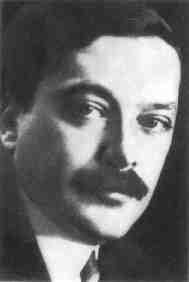Mark Aldanov
Mark Aldanov | |
|---|---|
 | |
| Born | Mordkhai-Markus Israelevich Landau November 7 [O.S. October 26] 1886 Kiev, Russian Empire |
| Died | February 25, 1957 Nice, France |
| Nationality | Russian |
| Genre | Biography, fiction, criticism, essays |
Mark Aldanov (Russian: Марк Алда́нов; Mordkhai-Markus Israelevich Landau, Mark Alexandrovich Landau, Russian: Мордхай-Маркус Израилевич Ландау, Марк Алекса́ндрович Ланда́у; November 7 [O.S. October 26] 1886 – February 25, 1957) was a Russian and later French writer and critic,[1] known for his historical novels.
Aldanov's first book about Vladimir Lenin, translated into several languages, immediately gained him popularity. Then followed a trilogy of novels attempting to trace the roots of the Russian Revolution. He also wrote a tetralogy of novels about Napoleonic wars.[1] All in all, he published 16 larger literary works and a great number of articles and essays. He was nominated for the Nobel Prize in Literature thirteen times.[2]
Biography
[edit]Mordkhai-Markus Landau (Aldanov) was born in Kiev in the family of a rich Jewish industrialist. He graduated the physical-mathematical and law departments of Kiev University. He published serious research papers in chemistry. In 1919 he emigrated to France. During 1922-1924 he lived in Berlin and during 1941-1946, in the United States.[1]
Ivan Bunin, the first Russian writer to win the Nobel Prize for Literature, nominated Aldanov for the Nobel Prize a total of six times - in 1938, 1939, 1947, 1948, 1949, and 1950.[3]
Mark Aldanov died in Nice, France.[1] His extensive correspondence with Vladimir Nabokov, Ivan Bunin, Alexander Kerensky and other emigre celebrities was published posthumously.
Novy Zhurnal
[edit]In 1942, while in New York, Aldanov cofounded Novy Zhurnal (The New Review; Russian: Новый журнал) together with his colleague and friend Mikhail Tsetlin.[4] Until November 1945 they both served as Editors-in-Chief of this publication, which is considered the oldest Russian language literary periodical in print published outside of Russia.[5] Among the review's contributors were Vladimir Nabokov, Ivan Bunin, Joseph Brodsky, Aleksandr Solzhenitsyn, and other notable Russian emigre writers.[6]
The Aldanov Literary Prize
[edit]Since 2007 Novy Zhurnal has been awarding The Aldanov Literary Prize conferred for the best novella or novellete authored by a Russian-language writer living outside or Russia.[5]
Bibliography
[edit]- The Ninth Thermidor
- The Devil's Bridge
- The Conspiracy
- St. Helena: Little Island
- Punch Vodka
- The Ninth Thermidor
- The Devil's Bridge
- Conspiracy
- The Tenth Symphony
- Saint Helena, Little Island
- For Thee the Best
- A Story About Death
- Before the Deluge
- Suicide
- The Key
- Escape
- The Cave
- The Fifth Seal - Тhe Beginning of the End
- Live As You Please
- Nightmare and Dawn
- Moltke the Younger
- Querétaro and Emperor Maximilian
References
[edit]- ^ a b c d e f Terras, Victor (1990). Handbook of Russian Literature. pp. 17–18. ISBN 0300048688. Retrieved 8 May 2012.
- ^ "Nomination Database". www.nobelprize.org. Retrieved 2017-01-24.
- ^ Nominations by Nobel Laureates. Retrieved February 5, 2014.
- ^ Novy Zhurnal // ru.wikipedia.org. Retrieved February 5, 2014.
- ^ a b Literaturnaya premiya imeni Marka Aldanova // ru.wikipedia.org. Retrieved February 5, 2014.
- ^ Novy Zhurnal - Official Website. Retrieved February 5, 2014.
- 1886 births
- 1957 deaths
- Writers from Kyiv
- People from Kievsky Uyezd
- White Russian emigrants to France
- Popular Socialists (Russia)
- Novelists from the Russian Empire
- 20th-century Russian biographers
- Biographers from the Russian Empire
- Male biographers
- Essayists from the Russian Empire
- Literary critics from the Russian Empire
- 20th-century Russian novelists
- 20th-century essayists
- Jews from the Russian Empire
- 20th-century Russian male writers
- Taras Shevchenko National University of Kyiv alumni
- 20th-century pseudonymous writers
- 20th-century French novelists
- Russian writer stubs
